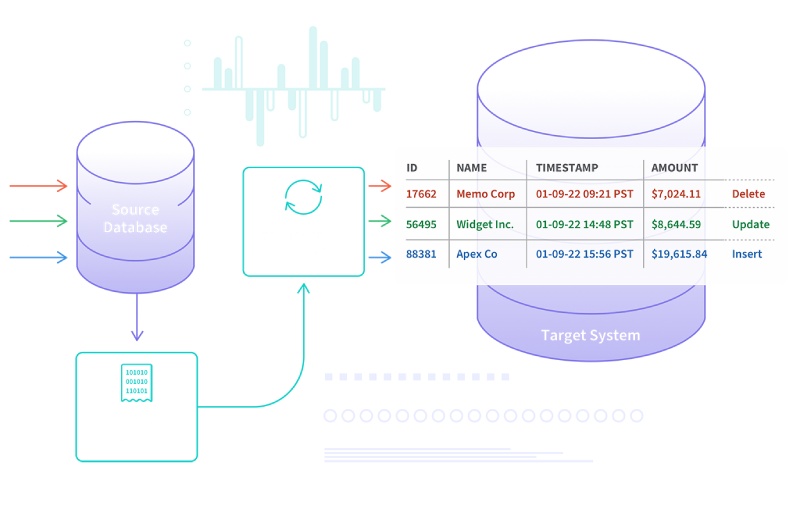
Businesses rely on effective methods to monitor and assess changes in their databases in the constantly changing data management landscape. With the help of Microsoft SQL Server’s Change Data Capture (CDC) capability, organizations can now integrate and analyze real-time data to make decisions based on the most recent data. In this post, we’ll examine SQL Server CDC is inner workings, fundamental ideas, implementation, and useful uses.
Table of Contents:
The Change Data Capture (CDC) feature of Microsoft SQL Server is a tool for capturing and documenting database table changes. CDC is an effective and non-intrusive way for tracking data alterations since it acts at a low level and captures changes straight from the transaction log, unlike triggers or manual recording.
In order to keep track of the transaction log, SQL Server creates a capture instance when CDC is made available for a database and particular tables. Inserts, updates, and deletions of data are all captured, and the collected changes are stored in CDC-specific tables that may be searched to access the changes.
There are various phases involved in enabling CDC, such as database configuration and table-level setup. You can quickly enable and manage CDC in SQL Server by using system-stored procedures and functions.
Enabling CDC on a Database
You must set the database option to allow CDC and select a retention period for the collected data in order to enable CDC on a database.
Configuring CDC for Tables
You can select particular tables for which you want to collect data changes after CDC is enabled at the database level. This is accomplished by enabling CDC on specific tables and choosing the columns to be tracked by CDC.
Managing CDC
The functions and stored procedures for managing CDC provided by SQL Server include disabling CDC for a database or table, adjusting the retention duration, and managing cleanup actions.
CDC provides a number of ways to examine and interact with the changes that have been recorded.
Reading CDC-Tracked Changes You can find and examine the collected changes by requesting CDC functionalities. The functions offer filtering and time-based querying capabilities, enabling you to track changes over a predetermined period of time or extract particular data updates.
CDC tracks updates, deletions, and new insertions in addition to new insertions. You may learn about a record’s whole history thanks to the modifications that were captured, which include the before and after values.
Working with CDC System Tables, Each CDC-enabled database has system tables that SQL Server keeps up-to-date to hold metadata and change data. Understanding these tables enables the effective use of the collected data.
CDC offers beneficial advantages for a variety of usage situations.
By recording changes in source systems and propagating them to target systems, CDC enables real-time data integration while maintaining consistent and up-to-date data across many databases.
By offering a thorough record of data changes, easing compliance with legal standards, and enabling quicker identification of unauthorised adjustments, CDC streamlines auditing procedures.
CDC enables effective extraction, transformation, and loading (ETL) procedures for data warehousing and analytics applications by recording changes in source databases.
Tracking slowly changing dimensions, where changes take place gradually over time, can be very helpful with CDC. Businesses can keep historical records and follow the development of data entities by documenting these changes.
It is essential to adhere to recommended practices when adopting CDC in order to guarantee optimal performance and maintain data consistency.
Monitoring CDC Performance
Processes used by the CDC, such as capture and cleanup activities, can be regularly monitored to assist spot performance issues and guarantee that updates are processed promptly.
Managing CDC Cleanup
It is critical to configure and schedule CDC cleanup activities to delete outdated change data in order to avoid consuming excessive amounts of storage.
Ensuring Data Consistency and Integrity
Even though CDC records changes at the database level, it is essential to guarantee referential integrity across all tables to prevent discrepancies in the data that is collected.
It is crucial to adhere to best practices to guarantee the smooth implementation of the CDC. It is possible to spot potential bottlenecks and ensure prompt processing of updates by keeping track of CDC performance, such as capture and cleanup tasks. To avoid excessive storage consumption, CDC cleanup activities must be configured and scheduled. The consistency and integrity of the collected data are further ensured by maintaining referential integrity across tables.
The strong Change Data Capture (CDC) feature in SQL Server enables real-time data integration, auditing capability, and effective data warehousing. Businesses can make use of CDC’s potential to make wise decisions and get a competitive edge in today’s data-driven environment by understanding its principles and adhering to best practices.
May is Small Business Month, a time to honor and recognize the achievements of the… Read More
Swiss International University (SIU) is on track to be one of the world's most respected… Read More
In a session that left students buzzing with fresh ideas and practical insights, Invertis University… Read More
At the 21st Shanghai International Automobile Industry Exhibition, which is surging with the wave of… Read More
Liverpool, UK—House of Spells and Comic Con Liverpool are once again collaborating to bring the… Read More
Introduction In India's booming EdTech space, there's one name that's making waves among Telugu students… Read More